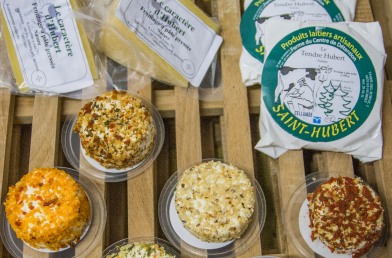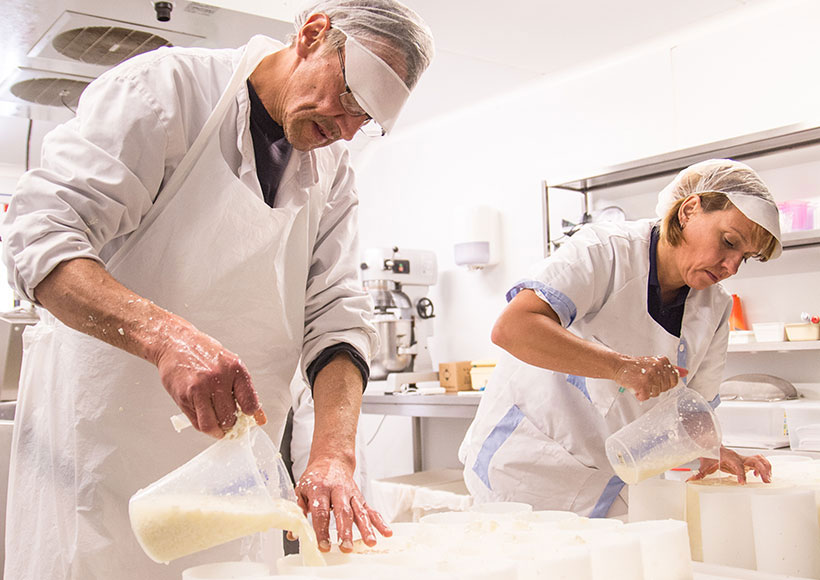// Interview: Kathleen Van De Vijver and Tine Verhenne
Belgian Prison Service
JT: What is CELLMADE and how does it differ from traditional approaches to prison work and industries?
Cellmade: We have started two years ago as a commercial label of Belgium Prison Labour. In the past, we were not so known by companies; we existed but it was not really communicated what we were there. But prisoners were doing such a good job, so we started addressing businessmen, telling them: “Don’t be afraid to take your businesses to prison, we can do good things for you and you can do good things for the inmates”.
It’s really important that companies appreciate us by the passion with which we do our work. We’re sure that companies feel that we have a brand-new style and a good “look and feel”, but they have to feel it when they come inside prison too. And that’s what we try to do each day: to motivate the staff so that they can show that motivation to companies so that they are really convinced of what they are doing. We are not afraid to think “commercial”.
Justice, government and being commercial seems like “a mix of bad words”, but we have to dare to be commercial and to have a real business approach, while addressing to businessmen. We think commercial and this seems to be the opposite of the world where we are working in.
Sometimes our prison officers do not really understand why we take this commercial approach, but that’s the only way that the management – and also the companies – will bring work to the prisons.
Otherwise, they may think: “what’s the difference between bringing the work to another country in Eastern Europe or to Morocco, where we can also find people that will do the job for a cheaper price?”
Our launching campaign was grounded on the baseline ‘prison is doing a good job’. With this statement, we brought a twofold message: first we say that prisons are not as bad as they seem to be – we do things in order to re-integrate the inmates and to prepare them to return to society – and second that inmates are capable of delivering good work for your business.
Before developing this corporate identity, prison labour in Belgium had no face, no branding, no look and feel, and that was the missing factor that was preventing us from reaching out to businesses.
Cellmade is not just about putting inmates to work, it’s a whole social idea! It does not only help the businessmen to have a low cost-labour force, it also helps inmates to earn money to pay the victims, while giving them a chance to be productive and to contribute with their expertise.
Prisoners were doing such a good job, so we started addressing businessmen, telling them: Don’t be afraid to take your businesses to prison, we can do good things for you and you can do good things for the inmates.
JT: Which products are being produced in Belgian prisons?
Cellmade: We should make the difference between the contract system (with which we have a lot of easy handling like folding up papers, assembling, labelling, etc), being extremely important for prisons where inmate’s turnover is very high, where there is no time to train the inmates with new skills, but there is still a need to provide work opportunities for most of them. This is the focus of the contract systems.
At the moment, we are moving further. We are mapping of the qualifications of inmates, as we strive to connect the production and skills needs of the enterprises and the work possibilities and skills of the inmates.
We hope that in a near future we can have the mapping of all those skills and competencies, so we can match the companies’ needs with inmates who have certain skills, or a certain professional profile that he/she used to do outside.
Producing things for a company, that’s our B2B approach. We see, in other countries, that more and more the Justice [sector] feels the need to be organized in a way to become more self-sufficient, so creating its own products and selling them directly to consumers. But that’s not so easy, because of the existing staff of our prisons.
We are doing a lot already: we print, we sew, we have a bakery, we make furniture, and we produce honey. Things that are made in prison more and more become hip. But we believe we shouldn’t lose focus on contract systems, and on creating products or services on behalf of a company as it’s the best way to involve large numbers of inmates in work activities. Besides, in some cases, when inmates are released, they have the chance to continue working in that company.
That’s an advantage you don’t have when you’re focused on making your own products. Introducing a product to the market requires a lot of time and technical staff. We agree that we need to balance both approaches: products of our own, yes, it is a great approach – we want to make ice cream in the prison farm in Ruiselede, where we are already producing cheese. It is nice to tell, but we need to keep our focus on attracting companies and helping them to produce according to their needs.
JT: How do you decide to produce a new product?
Cellmade: Deciding to have a new product it is not something we do after an exhaustive marketing study. Sometimes we have an officer, who is specialized, for example, in bakery, or we have an inmate who is specialized in furniture and they have some good ideas and a director says: “why not?” And we start.
So, it’s not like in [other] businesses, that first you do a business or marketing plan! Because we have to deal with the prison officers we have, they are not specialised or skilled in business areas, they all passed the exam for being prison guards. If, for example, tomorrow we don’t have a good baker, our bakery is going to close down!
Yesterday we had a huge reception in a prison that has a bakery inside. That is the bakery that makes the bread for all the prisons of Flanders. They produce a new style of bread because we have a new prison officer and two prisoners who are specialized in bakery. We are certain that in the upcoming months there will be a flow of nice things.
But this is what makes us vulnerable, as we are very dependent on the skills of the staff and inmates that we have in a certain moment. We are happy when they come up with ideas that can lead to products. This is one of the reasons – being the others the future employment opportunities that may be generate, or the skills development according to market needs – why the focus should be on contracts with companies.
JT: Prior to putting the inmates to work, you certainly have to provide them with some training. How does this work?
Cellmade: We try to have courses to teach inmates to have a profession, and, sometimes, first they learn the basics, and then they continue to learn while doing a job in the prison. As mentioned before, one of the main difficulties we have is the lack of specialization – in areas related to prison work – of the existing prison staff. As an example, we have a large order of furniture, but we do not have the staff to teach the inmates on how to do the job.
Generally, the training requirements and process depend on the project: sometimes the company provides a coach who sets up the training process; sometimes we work together with schools. Unfortunately, external collaborations have been blocked due to financial constraints.
We have to rely on our own resources and be self-sufficient due to these constraints. We are now busy with a project for a shoe repair centre. For this specific project, we have the contribution of an external school. After finishing the training period, the inmates get a certificate that allows them to start working in the shoe repair centre.
This is a very scarce profession in Belgium, so we need a lot of shoe repairers. Due to the lack of technical staff with specialized skills, we are currently working with external experts. In other situations, we accept that the external companies bring their own staff to monitor production, for example in technical high level and highly skilled work. This is normally the ideal situation as our staff is relieved from the quality control and can focus on administration and safety.
JT: How many inmates are involved in prison work?
Cellmade: 40% of the prison population is working: 20% (about 2250) works at our workshops and another 20% is working in household tasks.
JT: How many companies are engaged in contracts with prisons in Belgium?
Cellmade: We work together with about 300 companies. We have continuous projects, but also one-shot ones.
JT: How much revenue is generated through prison work?
Cellmade: The total revenue attained is about € 5 million. In terms of profit for the prison service, it’s about €50 000. We reinvest most part of Cellmade’s profit in improving prison and detention conditions, or in developing new programs.
Projects like fitness rooms and social welfare projects – like visiting conditions for inmates’ children – are paid by the money generated by Cellmade. As for the revenue of the inmates: a good worker earns an average of €300/month; they are paid for each piece delivered. It is good for our clients, so they’re not depending on the productivity, and inmates are rewarded for good work. The basis is € 6-7 per hour, as a cost for the company.
JT: What are the main challenges that you face?
Cellmade: There are many and different challenges. It is important to see that the inmates, as a group, are not one single group. We have many foreigners who do not speak our language, so when we approach them regarding a working process we face the language barrier.
Another challenge is related to the mental health condition of a large number of inmates. We have to make sure we have special projects for special groups. We cannot say: “Well, we have a new client, a new customer, and everyone can do this work!”
The turnover in some prisons is considerable. We have a request from a company that wants to start with the production of technical pictures for which a long training process is required, so we cannot choose inmates serving short sentences.
Another daily challenge we have to face has to do with the place that work has in the prison regime. It is not valued the same way by different decision-makers. The moment every prison governor agrees that prison work is one of the main topics in the regime, we can do it better.
We also have to deal also with dynamic security. If every prisoner is out of his cell to work, to earn money, to learn something, the whole prison will be more secure than when they are locked up for 23 hours a day because of prison lack staff!
Sometimes they say: “We cannot let them go to the workshops because there’s not enough staff” and sometimes we have to say: “Let them go to the workshops because it will be quieter all day long, because they will earn money, they’ll have money to send to their families, they do something and the prison will be more secure.” This is a battle we face every day.
Of course, there is also the shortage of technical staff challenge. Sometimes we want to run a project, but the staff is not prepared, or simply lacks motivation. The prison officers that are collaborating in the workshops do not receive a different wage from their colleagues, despite the extra effort that is required from them.
We really rely on their goodwill, on their strong internal motivation and on their interest to work with the inmates and to teach them something. We also have to deal with the unions who are normally against having prison officers involved in this kind of work. In the last months, we have experienced a big reduction in staff numbers. Despite this reduction, we cannot reduce the prison work activities or lose production quality.
Another important challenge refers to the fact that, in the upcoming years, Belgium will be investing in the construction of new prisons. Before building those, we must consider very carefully how we are going to organise the new workshops and which kind of work we want to do in the future.

JT: What are the key success factors of Cellmade?
Cellmade: Cellmade is growing. We have made a short research with the companies we are working with and we liked what we heard. Cellmade came in the right time.
At Cellmade we try to think and operate as a normal company. That is highly appreciated. Entrepreneurs and businessman think that when working with a prison they will be facing a totally different world – it is a different world – but we try to be as “normal” as we can.
We focus on what they need and in ways to optimize the production processes. We don’t say that after five o’clock we are closed. We need to be there for them. Of course, this means good planning, especially when you have large orders and short – very short – deadlines.
We have to plan and anticipate it all. We cannot forget that we are in a prison. Sometimes we want more. We want to have extra workers or work in the afternoon – usually in the prison we work only in the morning. Sometimes the unions are against it and we have to persuade them.
When we make a decision to attract a project, we really have to listen to everyone. Good planning and communication are essential. When we set up Cellmade as a commercial label, we’ve also created account managers.
In every team, in every region, we have prison officers that act as Cellmade account managers. They are motivated and have the “sales feeling”. They go out to the companies to explain what we do. The advantage they have is that they know the field very well. They know the constraints and know beforehand if a certain project can work, or not, and in which prison. We are really working with a Cellmade sales team.
Cellmade is a kind of an “outboard engine” because we are not really on board in the prisons, but we work as the motor of the prison work. This allows us to be “salesy” and focus on what our clients need. Cellmade is an opportunity to think outside of the box. Everyone in this story – society, inmates, prisons and business partners – is winning!
//



// Kathleen Van de Vijver is the coordinator for international relations and projects, project manager for the reorganisation of the prison labour policy, and process manager for the implementation of PrisonCloud at the Central Department for Prison Labour within the Belgian Prison Service.



// Tine Verhenne is part of the team that spearheaded the launch of Cellmade. Her fields of expertise are probation, social work and pedagogy. She’s been working with the Belgian Prison Service since 2013, having years of experience as a probation officer and having worked in nationwide electronic monitoring projects.


